Was 2017 a tipping point for women in Hollywood?
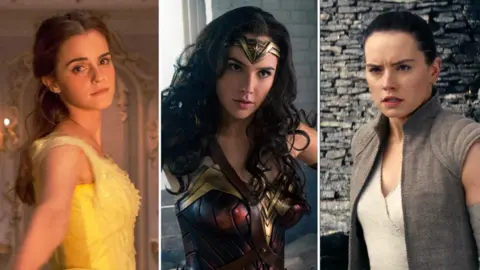 BBC
BBCHow significant is it that 2017's three top-grossing films had female leads?
The #MeToo campaign was groundbreaking: it was both personal and anecdotal, yet also a collective roar by women all over the world, sharing stories of sexual assault or harassment.
They were not just saying how pervasive the behaviour was: it was also a sign of empowerment.
Hollywood has been rocked by the Weinstein scandal and others which followed it.
And many hope it can re-invent itself in a more healthy shape.
Now, a new hashtag, #TimesUp, is rooting the fight against sexual harassment in legal battles.
But cultural shifts can take time.
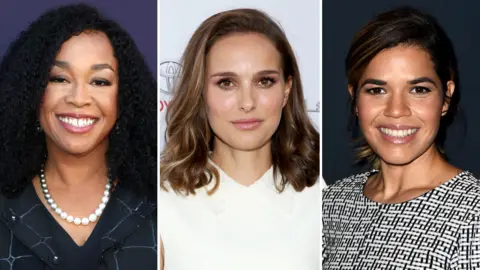 Getty Images
Getty ImagesFor years, the consistent absence of strong and leading roles for women in front of - and behind - the camera has been criticised. That too is changing.
And perhaps the reason it is changing is that when it comes to the movie business, it is money that talks.
Striking success
Women have always known that with a great story and good acting, they can carry a film.
Hollywood's executives have, for too long, doubted it, but there is proof now.
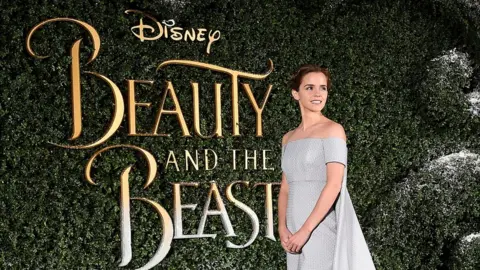 Getty Images
Getty ImagesThe three most popular films of 2017 in the US all featured women in their lead roles - Emma Watson in Beauty and the Beast, Daisy Ridley in Star Wars: The Last Jedi, and Gal Gadot in Wonder Woman.
Now, you could argue that in a year when powerful men were named and shamed, it is fitting that powerful women are to the fore.
Maybe it is a coincidence, not least when you consider how long it takes for a film to be made.
But bear in mind, the last time the top three films were fronted by women was back in 1958.
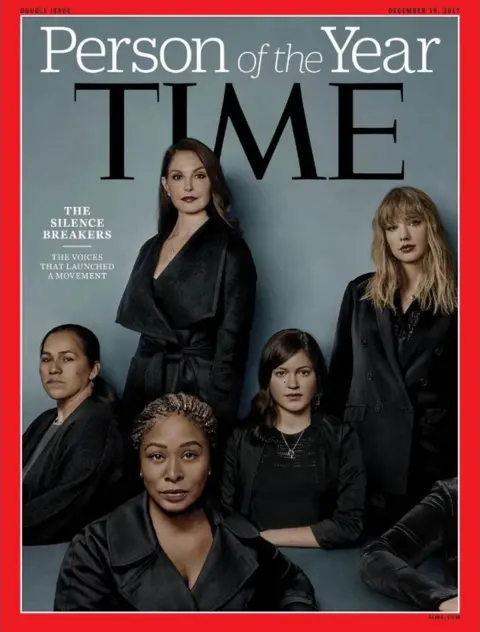 Time
TimeIt is significant that there are other films this year fronted by women which have captured the attention of audiences, and may well strike it lucky in the Oscars.
It obviously isn't just about persuading Hollywood that women can generate profits.
Even before 2017's record-breaking box office receipts had been counted, it had already been proven that Jennifer Lawrence can carry a film, as can Reese Witherspoon, or Kate Winslet, or Cate Blanchett, or many other top names.
There are other issues relating to money that are still being fought.
Ensuring women command the same salaries as men is a battle yet to be won. Having control of the purse strings, then, is critical.
Kathryn Bigelow is still the only woman who has won an Oscar for Best Director. Only four have ever been nominated in that category.
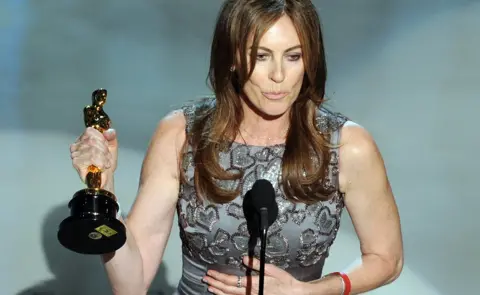 AFP/Getty Images
AFP/Getty ImagesFirsts should always be celebrated.
But I've always thought that it is when there are seconds and thirds that such things become part of the cultural fabric.
Equality of opportunity
And so it is, with female leads in money-making movies. When it stops being something to write home about, then it will simply be part of the way Hollywood does business.
And it is all part of a delicate balancing act.
Hollywood loves women - they are a core part of the package of the glamour presented to the world.
Women buy into this - not just those in Hollywood, but all of us who pay to watch the movies they are in.
Alongside all that is the obvious point that is, sadly, still necessary to make: women don't ask for special treatment, just equality. And that also means equality of opportunity.
And if what is preventing that is age-old habits of seeing women in a particular way, then perhaps the #MeToo and #TimesUp movements are important bellwethers - but we will only really see the full manifestation of cultural change a little further down the line.
